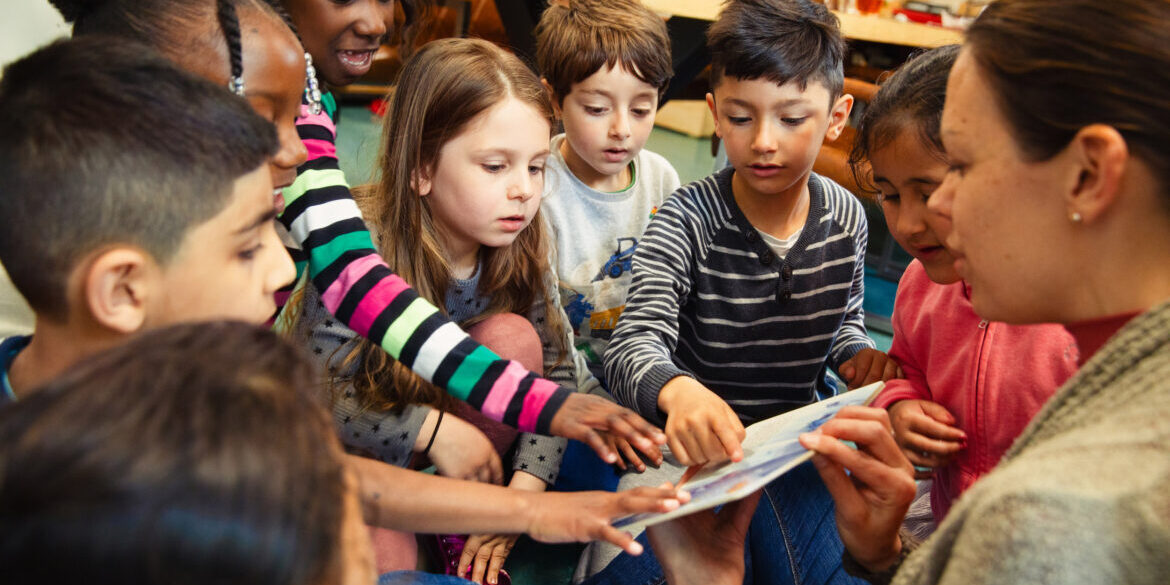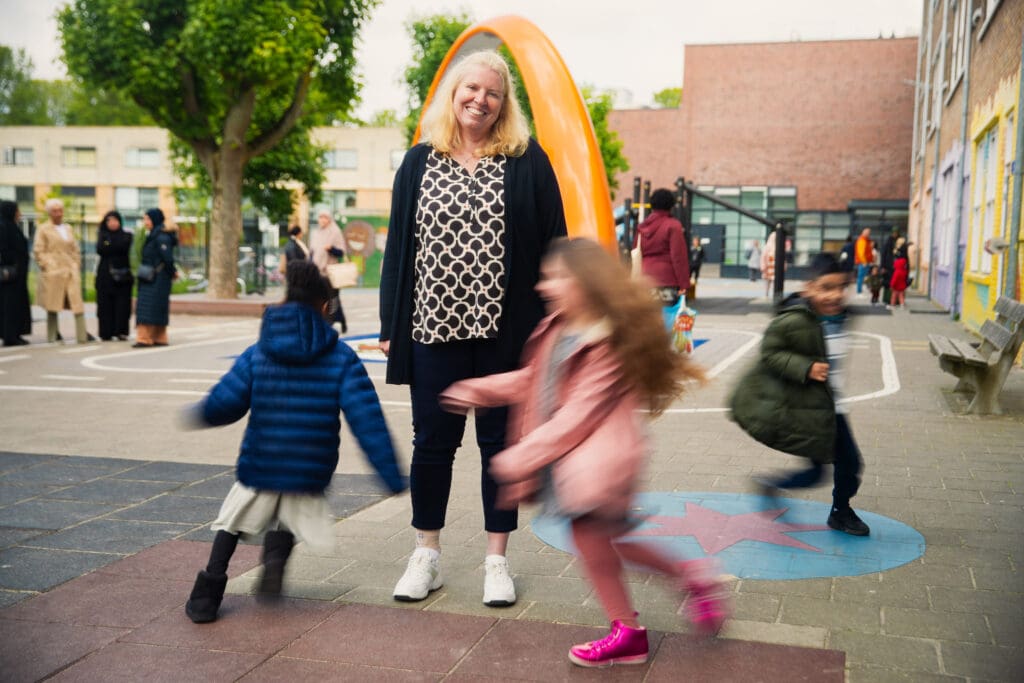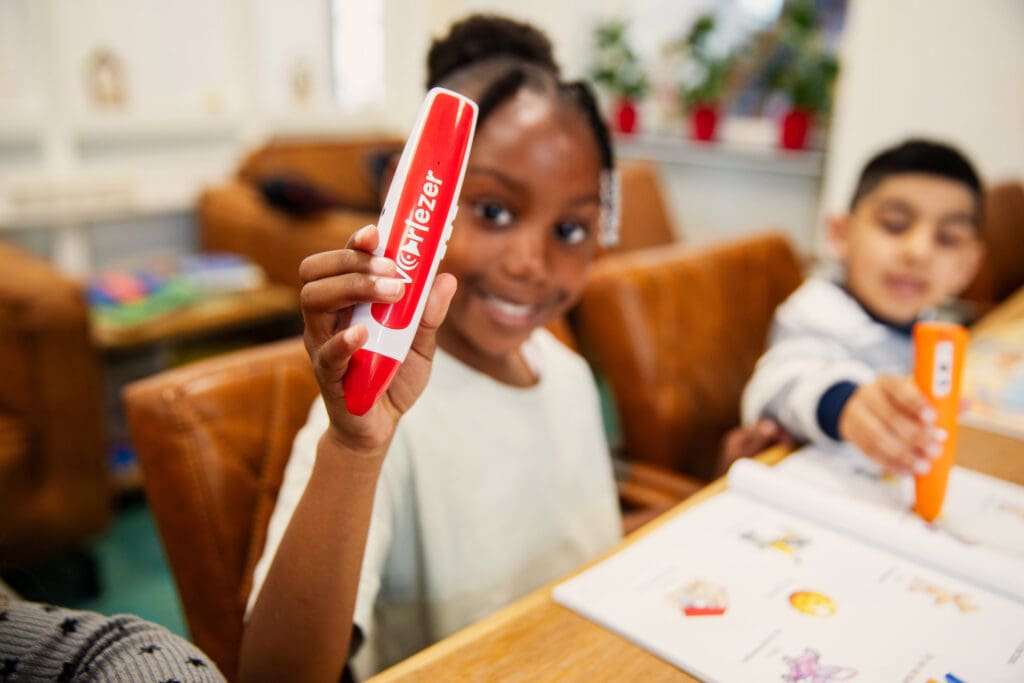

DATE
22 July 2024
TEXT
Jean-Pierre Geelen
IMAGE
Fleur Beemster
The P. Oosterle School: 'Only good education is the key to success for these children'
The P. Oosterleeschool is a beacon in the turbulent sea of 'problem district' Moerwijk. Headmaster Mariska Wubben set aside her career in business for this primary school. "I don't earn the most here, but this is absolutely the most fun I've had in my entire career," she says. BOIDR supports the school financially thanks to donors from networking dinners.
DATE
22 July 2024
TEXT
Jean-Pierre Geelen
IMAGE
Fleur Beemster
The P. Oosterle School: 'Only good education is the key to success for these children'
The P. Oosterleeschool is a beacon in the turbulent sea of 'problem district' Moerwijk. Headmaster Mariska Wubben set aside her career in business for this primary school. "I don't earn the most here, but this is absolutely the most fun I've had in my entire career," she says. BOIDR supports the school financially thanks to donors from networking dinners.
'J'e are braver than you believe, stronger than you seem and smarter than you think.' The quote from Winnie the Pooh must be hanging on the room door of teacher Eeke and teacher Lizzy, school social workers at P. Oosterle school, for a reason. Here, in the Moerwijk district of The Hague, pupils could use a little mental support. The primary school is the daily home for 360 children of 51 nationalities. It is up to the teachers to put all these different lives on the right track.
At Us In The Residence (BOIDR), a magazine full of successful people celebrating life, wholeheartedly endorses the importance of good (language) education as a key to success and supports the school financially (see below).
The P. Oosterle school
When we visit the school, green blinds hang in front of the windows on all three floors. With a little sense of symbolism, you could see shelter in it for the pupils. No superfluous luxury: Moerwijk, bordering the south side of the Zuiderpark, is one of the three poorest neighbourhoods in the Netherlands, with all its attendant problems. The neighbourhood consists largely of flats and 'typical Hague' porch houses from the years after World War II. Most are rented; some 80 per cent of residents there have a non-Western background. Not surprisingly, besides a branch of price-fighter Wibra, the shopping street also has a Surinamese lunchroom, as well as Kiymet's beauty salon and Ram's tropical shop. Poverty is rampant, as are crime and other social problems.
In that environment, Mariska Wubben (54), headmaster of P. Oosterle School, is the shining centrepiece. Every day, she welcomes "her" children at the school door in a highly personal manner. "That makes me happy," she says in her study, as she eats a belated lunch sandwich. She has been ruling the school for five years, and she does so with conviction and enthusiasm. And with people skills, because they are indispensable here, she says. For instance, greeting the children is a great way for her to gauge how the flag is flying among the pupils. "I have 360 children at school here. 330 of them are doing well. I worry about 30 or so. One of them has been reported to Safe House, another has parents fighting a divorce at home. Those are the kids where your feelers go out."


Mariska Wubben (54), headmaster of P. Oosterle School, used to travel half the world as a process engineer for Heineken. Until travelling started to bother her and a more social role as a manager became her calling.
'The kids here are more unpredictable'
The school has a few specific 'focus areas', such as dyslexia, fear of failure, concentration problems, reading and spelling problems, trauma and attachment problems, and ADHD. This too is everyday reality, Wubben acknowledges: "The children here are more unpredictable than in a white school. Children here grow up more like street fighters. They can also explode fairly quickly."
When greeting the children, Wubben also meets the parents. She addresses them when things don't make sense to her, or do. "For example, I explain that we also expect parents to have some involvement in a field trip. But equally, I hand out compliments. As a result, they notice: who sees everything."
The latter is true, she says. Thanks to a photographic memory, Wubben also does not forget easily. "I know all the children by name, I know what class they are in and what family they come from. That helps enormously, at a school like this."
Ravotten
A school like this. At first glance, there is little remarkable about it. In the playground at the back, full of playground equipment - the drawn road complex playfully teaches youngsters the rules of the road - children romp in various groups. Inside, the walls are full of old class photos: all beaming heads.
The steps in the building are also mnemonic devices: the upright sides of the steps are full of calculation aids such as: 'Dozen = 12 pieces', 'Area = length x width', and - displayed side by side in different colours: '0.25 per cent', '¼', '25 per cent' and a quarter of a circle.
But the 'Christian primary school', founded in the early 1950s and named after the educationist Oosterlee from the beginning of the last century, is not having an easy time of it. When Wubben took office five years ago, the school had had four different (interim) managements in a few years. Dissatisfied with that situation, 23 staff members had left. Since then, that shortfall has been filled, but it remains a somewhat shaky construction with many part-time workers, substitutes and deployment of unauthorised staff. "Not too many colleagues should fall ill at the same time," says Wubben. "Then the house of cards collapses and we have to let the children work at home for a few days, which is exactly what we don't want."
Donors
Because BOIDR sees the importance of a good foundation in life, during the BOIDR networking dinners donors for contributions. That worked: in early 2024, BOIDR handed over a sum of 14,000 euros to P. Oosterle School.
Wubben is happy about it: the first money has been spent on additional tools for language teaching. Such as bilingual books, for instance in the combination of Dutch and Dari, a variant of Persian spoken in Afghanistan. Wubben: "When we give the children those books to take home, the parents are pleasantly surprised. That way they can also read along themselves and learn Dutch at the same time, if necessary."
Another novelty: the reading pen. In accompanying booklets, children can slide that pen over certain words and then hear from the pen how that word is pronounced.


With the reading pen, children can slide over certain words in corresponding booklets and then hear from the pen how that word is pronounced, helping them in their reading and language development at P. Oosterle School.
Reading Express
Currently, Wubben is working on the Reading Express, a project where children and their parents are visited at home by volunteers who come to read aloud. "I have now applied for funding for more books and pens," says Wubben. If that fails, she will try again a door down the road - that too is the practice of a primary school in a 'problem neighbourhood'.
The school's funding is largely dependent on grants, which are uncertain every year; last year, Wubben submitted as many as 23 applications. Creativity is required to make all the ends meet. "For instance, we also work together with students from the Maerlant Lyceum in Benoordenhout. Every Tuesday they come here for a kind of social internship, during which they help pupils who have difficulty reading. Our children are helped by this, and the Maerlant pupils also become wiser: they have often never been to this neighbourhood before and thus broaden their world."
It works: "Last week, we got the latest Cito final results: 100 per cent of the students have passed the reference level 1F for Dutch language. That makes me really super proud."
'Giveaway afternoon'
The P. Oosterle School is - by necessity - more than just an educational institution. It is a beacon in a sea of turmoil, not only for the children, but for entire families. For example, the school regularly has a 'giveaway afternoon': anyone who wants may come and collect used items collected free of charge. Clothes, shoes and household goods - and everything goes. After the initial trepidation was overcome, the giveaway days are eagerly attended, according to Wubben. Wubben: "In the beginning, about ten parents came, but now as many as ninety."
The P. Oosterle school also provides breakfast for those who need it. Wubben: "I know pretty well which families live below the poverty line. For them, twice a week we give a breakfast bag to take home, for the whole family. The initial embarrassment about that has subsided: now we give away about ninety of them each time, helping about two hundred children. That's more than half our number of students."
Wubben has a remarkable CV: with her background in food technology, she worked at Heineken for a long time. As a process engineer, she travelled half the world for that company. Until she started to dislike travelling ('travelling for work is not that much fun') and a more social role as manager became her calling. After a search, she discovered that teaching attracted her. Even later, she saw that her strength was not so much in teaching as in managing that education.
It was at the time, early this century, when her first child was attending primary school herself and the teacher shortage was also an issue then. Since teaching had always attracted her, Wubben decided to retrain as a lateral entry teacher during a maternity leave. Another period of varying positions followed until she knew she wanted to become a school headmaster. "Preferably in a big city and a neighbourhood with a lot of problems," she says with almost entreaty. "That's where you can make the most difference." Exactly what motivates her.
Clean task
From brewing beer to cultivating knowledge: there is no logical connection, but for Wubben, the move was the right one. A period at a school at the asylum seekers' centre in Rijswijk convinced her that she had a clean job to do. "There I met a Syrian mother who had come to the Netherlands completely traumatised. She could not take care of her three children, which meant one would be placed out of home. She was given the heartbreaking task of choosing which child that would be. I saw how the care for that family did not start at all, that such a child first ended up in a crisis centre, was dragged from foster home to foster home and changed from a happy little boy into a pathetic heap of human beings in a short time. Whereas that would not have been necessary if the right help had been provided immediately."
It was then that Wubben realised there was work to be done. "During my travels, I saw a lot of poverty. I saw refugees arriving in the Netherlands and thought: we must have something to offer them. That is possible here, at the P. Oosterleeschool. Education is the only way out of misery, the key to success. So we have to make sure that is in order. That is always my motivation."
She has not regretted her turnaround for a moment. "I don't earn the most here, but this is definitely the most fun I've had in my entire career," she says.
'Let PD students teach more instead of learning details about geography'
As a man of practice, Wubben did develop a wish list. "The pabo is still seen by many as the cut-and-paste course, but there is a lot of reflecting in particular. I say: let students teach more instead of learning details about geography. Spending half the week in front of the class instead of one day like now, that would already make a big difference."
Another thing: care and education should be more integrated, as far as Wubben is concerned. "They are now two separate worlds that should be much more intertwined. I see it in practice: a child who comes to school with trauma or attachment problems will never learn properly if care is not also well organised. That is not happening now and that is a mortal sin."
Special concierge
One floor below Wubben's room we meet a special man: René van den Hoogenband, the caretaker for whom the school has been his regular base for 17 years. There, in a room entirely papered with the yellow-green of ADO Den Haag, he plays a home game: he lives only 600 metres away. "My own daughter was at school here, my grandson now too," he says with unadulterated, authentic Hague accent.
That's how strong the bond is with the P. Oosterle school as well as with the neighbourhood. Van den Hoogenband will never leave his neighbourhood, he says, he doesn't need to go on holiday. "I have seen local residents leave for Wateringse Veld and other neighbourhoods, but there are enough who regret it. This is where it lives. Everyone knows each other, all the shopkeepers, the residents. I know what's going on and who has which problems. That creates a bond."
Regularly, he even stays here on weekends. Bit of drilling, bit of messing around. And helping local residents, he does that too. "The other day, someone called here from across the street. The washing machine was broken, but they couldn't afford a new pull switch. The MediaMarkt charges 85 euros for it. Many people in this neighbourhood don't have the money for that. So then I just drop by after quarter past three, when I'm free. Right?"
The caretaker's daily work: doing laundry (there are two machines in his office) when another child has fallen and needs clean clothes. Fixing bicycles, repairing tyres, refilling the photocopiers, making coffee and tea for the staff, repairing equipment. In short, the caretaker is a jack-of-all-trades here.
Former pupils he still sees regularly. At least three of them work at the Jumbo on Leyweg, he says with pride.
Pistol
Or take the boy who had to drop out of school because his mother suddenly went back to Curaçao. He didn't want to, was afraid he would end up in crime. That's how it went, says Van den Hoogenband. "At 13, he was walking down the street with a gun and driving around in cars."
A year later, the caretaker met him: the boy had returned to the Netherlands, fleeing that crime. Van den Hoogenband says: "He got jobs, at the Albert Heijn supermarket or McDonald's. Then he wanted to become a security guard or the military police. I was able to help him with that. He has since done a kind of commando training; now, if there is a terrorist attack, he sits atop a tank with a machine gun to protect Schiphol or the Royal Family."
He just means: even with the P. Oosterlele School, you get a chance. "But you have to grab it. And I only help once."
'You can mean infinitely more in children's lives here'
The caretaker and the headmaster agree: the district and education both have a negative image, but the reality is completely different. Wubben: "We have to get rid of the image that it would be so tough to work at a school like this. Yes, it is different from a typical 'white school'. You have to be willing to put energy into this. The audience is more challenging, but that doesn't mean the work would be that much harder. And you can mean and achieve infinitely more in children's lives here. If you manage to do that, the pleasure is priceless."